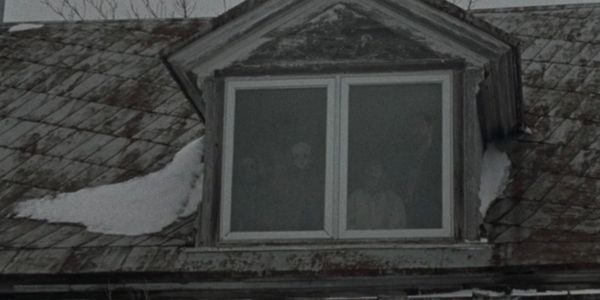One of the major benefits to MUBI’s streaming gimmick, which has now been replaced with a traditional library similar to the Criterion Channel, was that it forced a curated series of specific films so as to avoid the overwhelming nature of having too many choices. Sometimes I like to have things decided for me, especially when it forces me to explore art that I normally wouldn’t on first glance. In the final week of MUBI’s old format, I saw a number of uniquely fascinating Canadian films. Among them was Yung Chang’s incredibly moving portrait about Robert Fisk in This is Not a Movie, a short coming-of-age drama told in the third person about racial tensions called Delphine, and a Robert J. Flaherty-style docudrama One Day in the Life of Noah Piugattuk which recreates a meeting between an Inuit elder and a representative of the Canadian government during the Cold War. All of these movies wouldn’t have ever crossed my radar without MUBI’s curated streaming.
A Slowly Creeping Past
The final Canadian film, Denis Côté’s Ghost Town Anthology, was the best of the bunch, and it too was a movie thrust upon me without having to go look for it. In similar fashion to this specter of an unseen film looming on my TV screen, Ghost Town Anthology deals with a peculiar phenomenon in a small Quebec town way in the wintery outskirts of the province, where ghostly figures begin to appear in people’s homes and on the streets. This begins specifically after the death of a 21-year-old named Simon who’s car mysteriously veers off the road and crashes.

Côté’s approach in dealing with ghosts, and suspense in general, is similar to M. Night Shyamalan. Both filmmakers evoke tension from anticipation and anxiety. When Simon’s family starts to see his ghost in different places – a shed, an ice rink, even in their family car – their interactions with him are of a belief that he is actually there. They don’t question his presence the way many of the townspeople do. We start to see the ghosts through the eyes of the town’s residents, like shadows in corners of homes. Just the images of a pale face in a window, a set of feet on the top of the steps, are menacing only in the imagination of what they’re potentially capable of, not what they’re actually doing.
Small-Town Anxiety
The confrontation of individual loss is apparent in Simon’s family, but as a community, the town experiences these apparitions as an invasion on an insular and close-knit traditional life. The town mayor resists any help or assistance from Quebec City officials, consistently repeating “we are fine on our own.” It’s typical of such rural areas to prefer their small collective familiarity when navigating difficult times. The individuals of the town are helpful to each other – an elderly couple offers to provide protection and assistance to a young socially awkward woman named Anne who suffers mentally from the presence of the ghosts – but they also grow weary and combative as they fail to explain the massive disruption to their lives. A disruption, to be clear, that is in no way direct or tangible, but merely in the emotional anxiety of a closed-off community now suddenly finding itself in contact with the world.
Ghost Town Anthology tip-toes during its entire duration, quietly examining the past and present of a town that is both sinister and whimsical, not unlike David Lynch’s Twin Peaks. Côté examines small-town life in similar ways to Jeff Nichols’s Take Shelter, where the unexplained mental phenomena of fear and paranoia are not openly talked about and prove a paradoxical nature of such communities, where friendliness and neighborliness has a hard time penetrating past ‘social norms’. The movie’s nearly colorless canvas is evocative of an existence that prefers a quiet, informal, and self-reliant atmosphere. It is also one that evokes the presence of a forgotten and bedeviled past buried underneath it.
What are your favorite ghost stories? Let us know in the comments below!
Ghost Town Anthology is currently streaming on MUBI.
Watch Ghost Town Anthology
Does content like this matter to you?
Become a Member and support film journalism. Unlock access to all of Film Inquiry`s great articles. Join a community of like-minded readers who are passionate about cinema - get access to our private members Network, give back to independent filmmakers, and more.